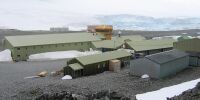Prince Æthelstan Research Station: Difference between revisions
No edit summary |
|||
| Line 19: | Line 19: | ||
|} | |} | ||
The '''Prince Æthelstan Research Station''' is a polar research station located on the southern ice cap of [[Micras]]. Named after a mythical hero from the legends of [[Nova England]], the research station was established to improve the accuracy of regional weather forecasting, as well as to monitor the potential impacts of icebergs on shipping. Established in 1692AN by the [[Government of the South Sea Islands]], the research station has no permanent population and houses a crew of around 20 on a two month rotation. | The '''Prince Æthelstan Research Station''' is a polar research station located on the southern ice cap of [[Micras]]. Named after a mythical hero from the legends of [[Nova England]], the research station was established to improve the accuracy of regional weather forecasting, as well as to monitor the potential impacts of icebergs on shipping. Established in 1692AN by the [[Government of the South Sea Islands]], the research station has no permanent population and houses a crew of around 20 on a two month rotation during the southern hemisphere summer. During winter the station is largely mothballed, with remote access maintained between the station's systems and personnel on the [[South Sea Islands]]. | ||
==Location== | ==Location== | ||
The research station is located south west of [[South_Sea_Islands#Trinity_Island|Trinity Island]], approximately one kilometre from the coast of the southern continent. Due to the build up of sea ice during the winter months, the station can be up twelve kilometres from open water during severe weather. | The research station is located south west of [[South_Sea_Islands#Trinity_Island|Trinity Island]], approximately one kilometre from the coast of the southern continent. Due to the build up of sea ice during the winter months, the station can be up twelve kilometres from open water during severe weather. | ||
==Supplies== | |||
During periods of occupation, the station is supported and supplied by the Royal Survey Ship Madison. The [[Logistic Support Vessel]] includes a reinforced hull, allowing it to undertake ice breaking duties and maintain the supply routes to and from the research station. Additionally, the Madison is also tasked with transporting personnel between the [[South Sea Islands]] and the ice cap, as well as carrying out emergency evacuations when necessary. | |||
[[Category:South Sea Islands]] | [[Category:South Sea Islands]] | ||
[[Category:Science]] | [[Category:Science]] | ||
Revision as of 16:33, 12 January 2021

| ||||
| In service with: | ||||
| Purpose: | Environmental Research | |||
| Laid down: | 1692 AN | |||
| Location: | Micras Southern Ice Cap | |||
The Prince Æthelstan Research Station is a polar research station located on the southern ice cap of Micras. Named after a mythical hero from the legends of Nova England, the research station was established to improve the accuracy of regional weather forecasting, as well as to monitor the potential impacts of icebergs on shipping. Established in 1692AN by the Government of the South Sea Islands, the research station has no permanent population and houses a crew of around 20 on a two month rotation during the southern hemisphere summer. During winter the station is largely mothballed, with remote access maintained between the station's systems and personnel on the South Sea Islands.
Location
The research station is located south west of Trinity Island, approximately one kilometre from the coast of the southern continent. Due to the build up of sea ice during the winter months, the station can be up twelve kilometres from open water during severe weather.
Supplies
During periods of occupation, the station is supported and supplied by the Royal Survey Ship Madison. The Logistic Support Vessel includes a reinforced hull, allowing it to undertake ice breaking duties and maintain the supply routes to and from the research station. Additionally, the Madison is also tasked with transporting personnel between the South Sea Islands and the ice cap, as well as carrying out emergency evacuations when necessary.